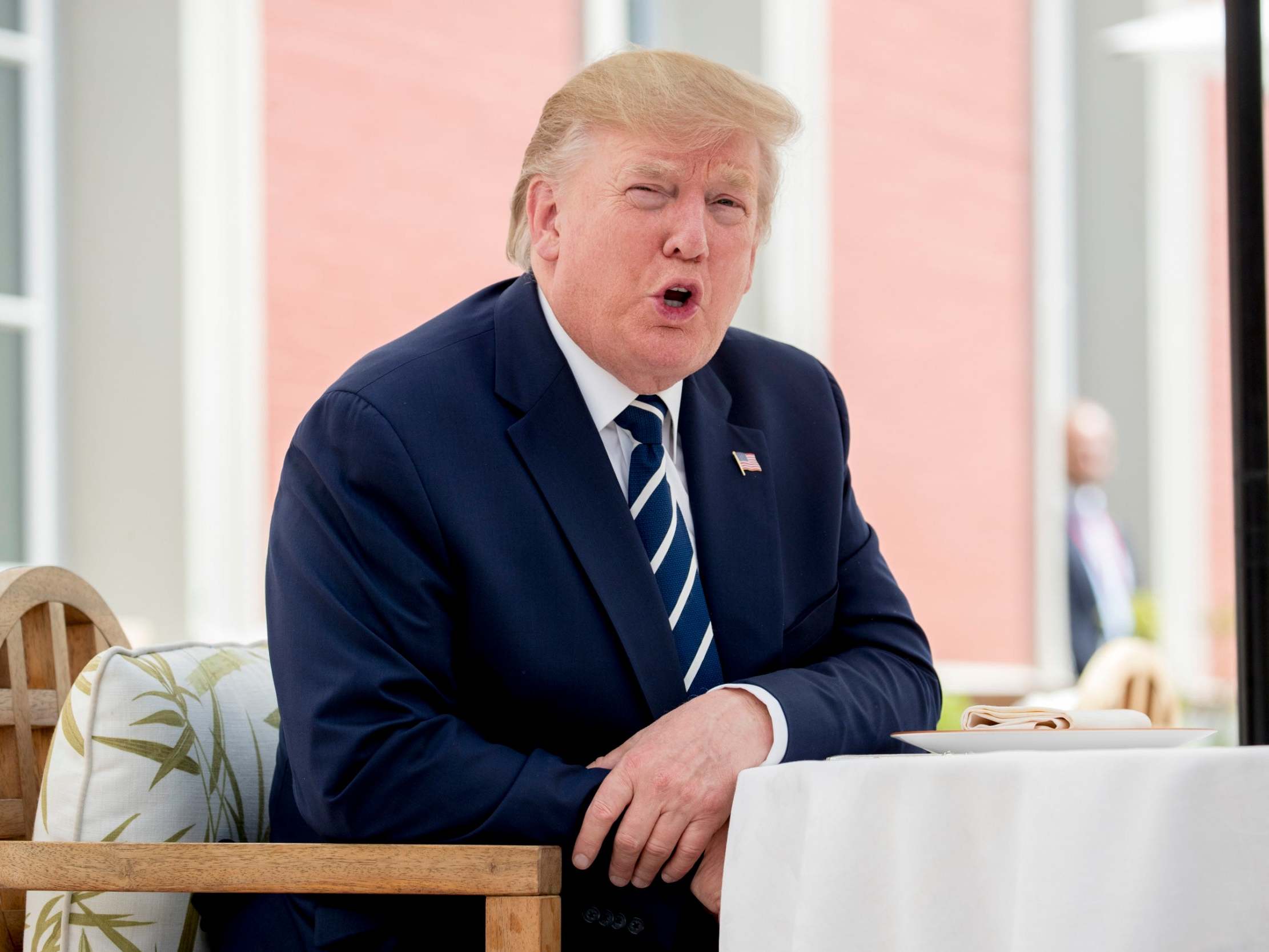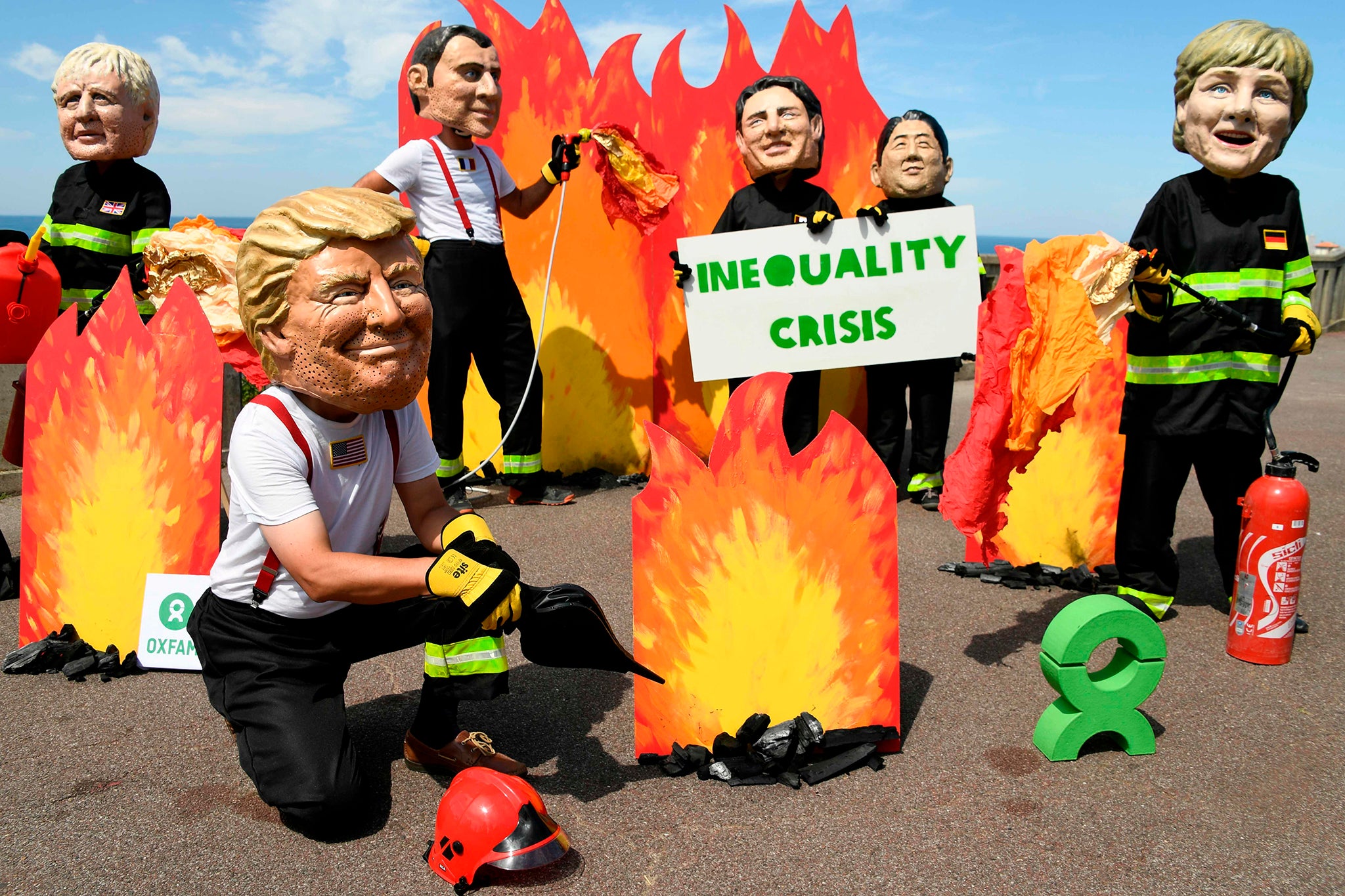Brexit: US trade deal will not be ‘plain sailing’, Johnson warns ahead of meeting with Trump
Prime minister to confront US president over restrictions to trade for UK pork pies, railway carriages and cauliflowers
Your support helps us to tell the story
From reproductive rights to climate change to Big Tech, The Independent is on the ground when the story is developing. Whether it's investigating the financials of Elon Musk's pro-Trump PAC or producing our latest documentary, 'The A Word', which shines a light on the American women fighting for reproductive rights, we know how important it is to parse out the facts from the messaging.
At such a critical moment in US history, we need reporters on the ground. Your donation allows us to keep sending journalists to speak to both sides of the story.
The Independent is trusted by Americans across the entire political spectrum. And unlike many other quality news outlets, we choose not to lock Americans out of our reporting and analysis with paywalls. We believe quality journalism should be available to everyone, paid for by those who can afford it.
Your support makes all the difference.Striking a post-Brexit trade deal with the US will not be “plain sailing”, Boris Johnson has warned as he prepared for his first face-to-face meeting with President Donald Trump since becoming prime minister.
A US free trade agreement was held out by Leave campaigners including Mr Johnson as the greatest potential benefit of EU withdrawal, but the PM has now conceded that he will require “compromises” from Mr Trump to secure a deal that both sides once insisted would be done swiftly.
Speaking ahead of breakfast-time talks at the G7 summit in Biarritz, France, the PM made clear he would tell Mr Trump that the key US priority of access for its healthcare corporations to NHS contracts is “not on the table”.
And he said that the US would have to lift “very considerable barriers” to UK products ranging from railway carriages to pork pies and cauliflowers being sold in US markets.
In an indication that Downing Street accepts a US trade deal will not follow hot on the heels of the UK’s planned departure from the EU on 31 October, a senior British official said: “We want a deal as soon as we can, but it has to be a deal which works for the UK.”
The much-vaunted transatlantic accord has already hit obstacles from British opposition to accepting US chlorinated chicken and hormone-boosted beef. And London gave a lukewarm response to suggestions from Trump envoy John Bolton that speedy mini-deals on cars and manufacturing could be concluded separately to prevent them being bogged down in lengthy wrangles over agriculture, healthcare and digital services.
As Mr Trump threatened to tax French wine “like they’ve never seen before” in retaliation for Emmanuel Macron’s levies on US tech companies, Mr Johnson signalled he may be ready to give ground on the UK’s proposed digital services tax on social media and internet search giants.
“We must do something to tax fairly and properly the online businesses that have such colossal sales in our country,” said the PM. “We must do something to ensure we tax them properly.”

But he added: “I am open to discussion about how we do that and I am willing to listen to our American friends about the modalities but we must do something to tax them fairly.”
Mr Johnson revealed that he used an eve-of-summit phone call with Trump on Friday to list a series of gripes about the treatment of UK companies, including:
* Restrictions on the sale of British-made shower trays, whose lips are too low for US standards regulations
* Requirements for UK wallpaper, pillows and fabrics to be subjected to additional fire tests in the US, despite already being tested in the UK
* US tariffs of 14 per cent on railway carriages imported from the UK, when the same product exported from America to Britain attracts a tariff of just 1.7 per cent
* The failure of the US to resume imports of British beef since the 2014 lifting of a ban imposed because of mad cow disease
* Food and Drug Administration rules which block the sale of Melton Mowbray pork pies
* Limits on the number of ports which can accept deliveries of UK cauliflowers and a complete ban on UK bell peppers
* Requirements for British wines to be sold through US distributors and a ban on British micro-breweries that does not apply to US beer-makers in the UK
* The need for British insurance firms to deal with as many as 50 US regulators, compared with two in the UK
* Public procurement rules which mean that all branches of the US military are banned from purchasing measuring tools like rulers from British stationery companies
“Of course, I think there is a massive opportunity for Britain but we must understand that it is not all going to be plain sailing,” the prime minister told reporters in Biarritz.
“There remain very considerable barriers in the US to British businesses which are not widely understood.
“Last night, I had my first opportunity to mention some of these to the president. And I will mention them again because it is very important if we are going to do a fantastic free trade deal that is a free trade that works in the interests of British business.

He highlighted the issue of “cabotage” rules, which prevent UK shipping companies from moving goods between locations in the US, when their American counterparts face no such restriction in Britain.
And he said: “The point I am making is that there are massive opportunities for UK companies to open up, to prise open the American market. We intend to seize those opportunities but they are going to require our American friends to compromise and to open up their approach because currently there are too many restrictions.
“It goes without saying that there are sectors of the UK economy, not least the NHS, which remain completely off-limits as far as any trade deal with America goes.
“We will not allow the NHS to be on the table at all.”
Rupa Huq MP, a leading supporter of the People’s Vote campaign, told The Independent: “In 2016, Brexiters suggested that a US trade deal could be one of the big prizes of leaving the EU.
“But now we know that not only will any deal with Trump’s America be much more complicated than they pretended, it could also involve plenty of nasty surprises like lower food standards and opening up the NHS to private US healthcare companies. That's not what anyone voted for.
“Every day we're learning more and more new facts about the realities of Brexit, and though Boris Johnson won't admit it, it's a million miles away from the promises he and his fellow leave campaigners were making during the referendum.”
Mr Johnson’s arrival in 10 Downing Street was warmly welcomed by Mr Trump, and the pair have already spoken by phone five times in little more than a month of his premiership.
But tensions are already beginning to show over Mr Johnson’s determination to be a champion of free trade, with the PM warning Mr Trump last night that he risked being blamed for a potential global recession if he continued to escalate his trade war with China.
Mr Johnson shied away from accepting the mantle of “Britain’s Trump” bestowed on him immediately after his election as Conservative leader.
Asked whether he took the title as a compliment, he said only: “I was born in the United States. I think the most important thing for any prime minister of the UK is to have a very close friendly relationship with our most important ally and that’s what I intend to promote.”
But, despite recent polls suggesting that as few as 21 per cent of UK voters have a favourable view of Mr Trump compared with 67 per cent who see him unfavourably, Mr Johnson suggested that their was an underlying appreciation of the US president in Britain.
Asked if Mr Trump was more popular in the UK than people think, he replied: “That’s very likely. President Trump has pioneered a quite remarkable way of communicating directly with the electorate. My impression is that is also popular with large numbers of people in our country.”
Unlike Mr Trump, who has travelled to Biarritz with wife Melania, Mr Johnson was not accompanied by his partner Carrie Symonds to the summit, where leaders’ spouses have their own programme of events. He declined to respond to queries about the decision that Ms Symonds would not attend.

Join our commenting forum
Join thought-provoking conversations, follow other Independent readers and see their replies
Comments